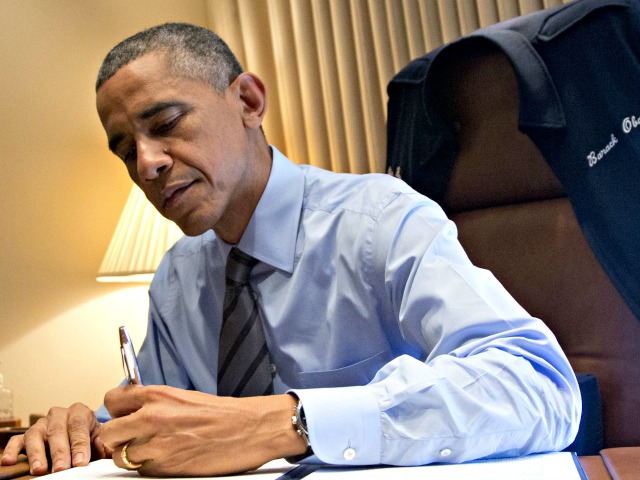Barack Obama and his spokespeople have claimed he has used unilateral executive action far less than previous presidents, citing his lesser number of executive orders.
It’s not true, according to USA Today. Obama has evaded scrutiny of his massive unilateral actions by using executive memoranda instead of executive orders. The memoranda have the same power to make law as executive orders, but allow Obama to fly under the radar due to various considerations:
- Executive orders are numbered, memoranda are not;
- Executive orders are indexed, memoranda are not;
- Proclamations and executive orders are published in the Federal Register before memoranda;
- In 1962, President Kennedy issued Executive Order 11030, which stated that executive orders were required to have a “citation of authority.” Memoranda do not require such a citation.
Obama and his defenders have made a habit of decrying critics ripping Obama for his unilateral actions:
Obama, July, 2014: “The truth is, even with all the actions I’ve taken this year, I’m issuing executive orders at the lowest rate in more than 100 years. So it’s not clear how it is that Republicans didn’t seem to mind when President Bush took more executive actions than I did.”
Senate Majority Leader Harry Reid, on the floor of the Senate, July, 2014: “While Republicans accuse President Obama of executive overreach, they neglect the fact that he has issued far fewer executive orders than any two-term president in the last 50 years.”
White House Press Secretary Jay Carney, February 2014: “There is no question that this president has been judicious in his use of executive action, executive orders, and I think those numbers thus far have come in below what President George W. Bush and President Bill Clinton did.”
As of Tuesday. Obama has issued 195 executive orders and 198 presidential memoranda. Obama’s number of memoranda dwarfs his predecessors; he has signed 33% more in his six-year tenure than Bush did in eight years, and 45% more than Bill Clinton did in his eight years. The combination of orders and memoranda is the greatest since Harry Truman. Obama is the first president to sign more executive memoranda than executive orders, preserving his patina of eschewing unilateral action.
Some of the memoranda Obama has issued are quite significant, including: developing a pilot program to implement a new retirement savings account for low-income workers, instructing the Department of Education to permit various borrowers to top their student loan payments at 10% of income, forcing federal law enforcement agencies to track any firearm involved in a federal investigation, and allowing more availability of relevant executive branch records to the National Instant Criminal Background Check System.
That list does not include Obama’s recent forays into the immigration issue, which included supervising a transformation of the U.S. immigration system. Every single move Obama made as part of his immigration plan in November came without an executive order.
Kenneth Lowande, writing in Presidential Studies Quarterly, said,
“If you look at some of the titles of memoranda recently, they do look like and mirror executive orders.” He added that memoranda elicit less notice, saying an “executive order immediately evokes potentially damaging questions of ‘imperial overreach.'”
The salient point of memoranda is that they are binding on future administrations unless a future president explicitly revokes them. The Office of Legal Counsel has stated that executive memoranda and executive orders are essentially the same.
The Office of Legal Counsel itself admitted the huge number of Obama’s memoranda the very first year he was in office, asking for a 14.5% budget increase, claiming that part of the reason was “the large number of executive orders and presidential memoranda that has been issued.” Obama hasn’t stopped with orders and memoranda; in the area of national security alone, he has written roughly 30 presidential policy directives, which a federal court ruled are “the functional equivalent of an executive order.”

COMMENTS
Please let us know if you're having issues with commenting.